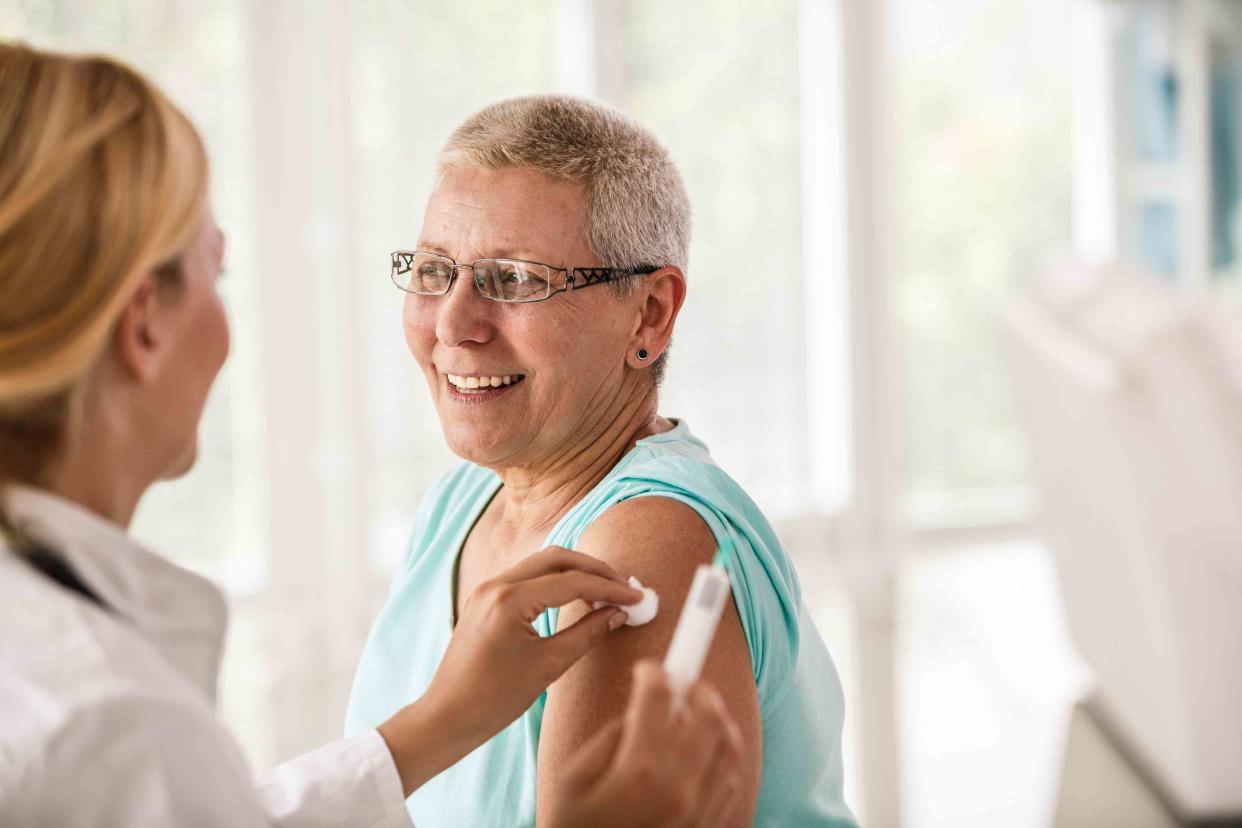Adults 60+ Will Have 3 RSV Vaccines to Choose From This Year

fotostorm / Getty Images
Fact checked by Nick BlackmerFact checked by Nick Blackmer
Key Takeaways
The FDA recently approved mRESVIA, the first mRNA vaccine for RSV, for adults aged 60 and older.
The CDC’s Advisory Committee on Immunization Practices will meet in late June to discuss recommendations for rolling out the vaccine.
The Food and Drug Administration (FDA) has approved mRESVIA, a new vaccine made by Moderna, to help protect adults aged 60 and older from respiratory tract infections caused by respiratory syncytial virus (RSV).
RSV is a virus that most commonly occurs in the fall and can affect anyone. But it can be most dangerous in very young children and older adults, Robert Hopkins, MD, medical director of the National Foundation for Infectious Diseases, told Verywell.
Two other RSV vaccines, Arexvy from GlaxoSmithKline (GSK) and Abrysvo from Pfizer, received FDA approvals last year. mRESVIA is the first of the RSV shots to use mRNA, the same vaccine technology used in COVID vaccines made by Moderna and Pfizer.
The FDA approved mRESVIA based on data from a clinical trial that included more than 35,000 adults aged 60 years or older in 22 different countries. The trial showed that the vaccine was close to 84% effective in preventing lower respiratory tract disease caused by RSV, which is on par with both of the existing RSV vaccines.
Related: Half of Americans Who Need an RSV Vaccine Have Never Heard of It, Survey Finds
Mild Side Effects So Far
The mRESVIA clinical trial showed any reactions to the vaccine were mild to moderate, including injection site pain and fatigue. Importantly, none of the participants experienced Guillain-Barré syndrome (GBS), a rare neurological disorder reported in a small number of recipients of both Pfizer and GSK’s RSV vaccines. That specific side effect prompted the CDC last year to recommend that older adults talk to their doctors about getting the vaccine rather than just outright recommending it—a process referred to as “shared decision-making.”
More time and more shots administered are needed to really know how long protection lasts and whether GBS is truly a problem with any of the vaccines, said Hopkins.
“We have a much better idea of any possible side effects once a drug or vaccine is used in the wider population, which can be millions of people, rather than the thousands in a clinical trial,” he said.
Related: What Are the Side Effects of the New RSV Vaccines?
When Will Moderna’s RSV Vaccine Be Available?
The next step for mRESVIA is a review by the CDC’s Advisory Committee on Immunization Practices (ACIP), which will meet at the end of June. ACIP recommended the other two RSV vaccines last year.
A recommendation from ACIP means that insurers will cover the vaccine.
William Schaffner, MD, an infectious disease expert at the Vanderbilt University Medical Center, thinks it’s likely that ACIP will continue its shared decision-making recommendation for mRESVIA as well.
Regardless of which RSV vaccine you pursue, it’s important to talk to your doctor about it “before heading to a clinic or pharmacy to get the shot,” Aaron Glatt, MD, chief of infectious diseases at Mount Sinai South Nassau Medical Center in New York and a spokesperson for the Infectious Diseases Society of America, told Verywell.
Anyone over 60 should bring up the RSV vaccine with their doctor, but this is especially true “if you are 60 and older and have lung health conditions, or you are in your mid-70s, when RSV can be more likely to pose a threat,” Glatt added.
The conversation with your doctor should include whether the vaccine is appropriate for you, and if so, which one to get and when to have it.
If you received an RSV vaccination last year, there is no recommendation currently for another dose.
What This Means For You
If you are 60 or older, haven’t received and RSV vaccine before, and don’t have a scheduled visit with your doctor this summer, consider making an appointment soon. That’s because if you and your doctor agree that an RSV vaccine is right for you, you may want to get it by mid to late August. That way, you can have some time between shots before it’s time to get your fall flu shot and an updated COVID-19 vaccine, which is expected to be recommended for older adults by the CDC for the fall.
Read the original article on Verywell Health.

